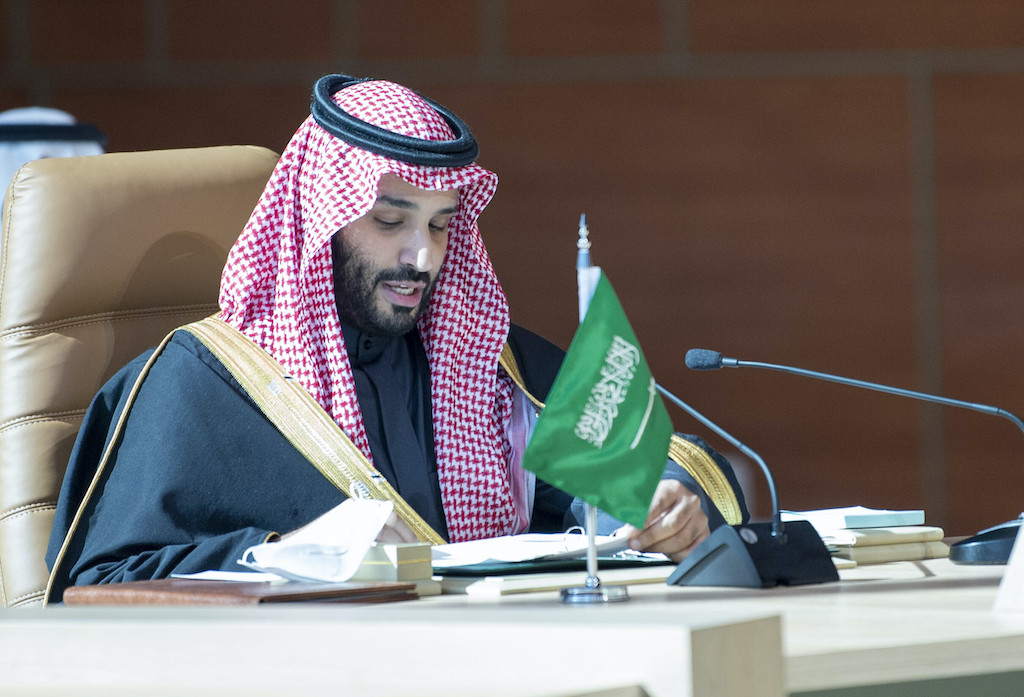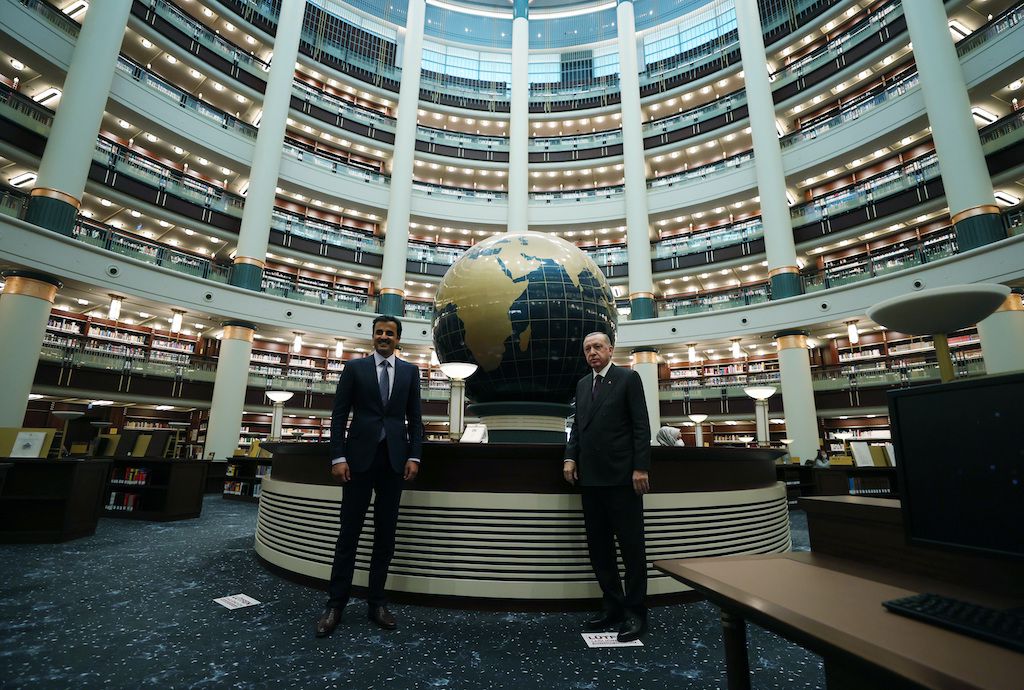An uneasy truce in the Gulf
Saudi Arabia, the UAE, Bahrain and Egypt officially ended their diplomatic and economic boycott of Qatar. Riyadh’s attempt to get in the Biden administration’s good graces has led to a strategic truce, but it is still unclear if this will lead to policy changes in the region.

In a nutshell
- The boycott of Qatar is over, but the conflict in the Arab Peninsula continues
- Many Arab states are leery of Qatar’s close relations with Iran and Turkey
- The uneasy truce in the Gulf is an attempt to please the new U.S. administration
The crisis between Qatar and its neighbors appears to be over. A so-called “solidarity and stability deal” was reached at the 41st Summit of The Cooperation Council for the Arab States of the Gulf (GCC) in the Saudi city of Al-Ula on January 5, 2021. At the event, Saudi Arabia, the United Arab Emirates, Oman, Bahrain, Kuwait and Qatar renewed their pledge to strengthen their cooperation in all fields, including foreign policy, economic integration, setting up a unified defense system and fighting terror, as stipulated in the GCC charter. Present at the summit, the Egyptian foreign minister endorsed the agreement.
Washington’s push
United States President Donald Trump had exerted a great deal of pressure on both sides, hoping for another breakthrough success in the Middle East, in addition to the Abraham Accords, before the end of his term in office. The conflict with Qatar exploded on June 5, 2017, and derailed the grand design of a united front of Gulf states against Iran that the U.S. leader had unveiled to representatives of 54 Arab and Muslim countries at the May 2017 Riyadh summit, during Mr. Trump’s first visit to Saudi Arabia. Kuwait’s mediation efforts had gone nowhere until Jared Kushner, Mr. Trump’s son-in-law, convinced Saudi Crown Prince Mohammed bin Salman, often referred to as MbS, to intervene.
The crown prince grasped an opportunity to open a dialogue with a new Democratic administration that had been sending negative messages during the campaign about human rights in Saudi Arabia, the sordid Khashoggi affair and the war in Yemen. It was imperative for the Saudis to generate some goodwill with the president-elect, Joe Biden, who was eyeing a return to the nuclear deal with Iran and would want all his Gulf allies on board.
Qatar went along with the plan to resume normal relations and form a strategic truce in the Gulf, even though the Al-Ula deal failed to address the core issues of the conflict.
Fissure in the Gulf
The crisis had been precipitated by Emirati Crown Prince Mohammed bin Zayed, with MbS’s backing. Qatar had long carried out a foreign policy distinct from that of the other Gulf states, which they had seen as endangering their security. It favored the Muslim Brotherhood and assisted radical Islamic organizations such as al Qaeda and Brotherhood militias in Libya and Syria; it had working relations with Iran, Saudi Arabia’s sworn enemy, and enjoyed close links with Turkey, another Brotherhood supporter.
President Trump’s plan for a united Gulf front – with Israel’s silent backing – against Iran was in peril.
Bahrain had a long history of territorial conflicts with Qatar. Relations were also strained between Qatar and Egypt, which had ousted the Muslim Brotherhood from power and cut ties with Turkey. Lately, flare-ups with Egypt had been doused – less by Doha’s pledging to mend its ways than from a wish to preserve unity among Gulf countries. Qatar hardly budged, however; its Al Jazeera television channel kept inciting anti-Saudi Arabia and anti-Egypt sentiment, while encouraging radical Islamic movements.
The trigger was Qatar News Agency quoting the Qatari emir giving fulsome praise to Iran’s policy in the region and to Hezbollah and Hamas. Saudi Arabia, the Emirates, Bahrain and Egypt responded by launching a diplomatic and economic boycott, and a land blockade. It was later suggested but never proved that hackers, perhaps at the UAE’s behest, had planted the provocative news item. President Trump’s plan for a united Gulf front – with Israel’s silent backing – against Iran encountered a major roadblock.

An ultimatum presented Qatar with 13 demands, including cutting off ties with Iran, ending all assistance to the Brotherhood and Islamic terror organizations, shutting down the Al Jazeera channel and closing the military base established by Turkey in 2014. To put pressure on Doha, the Saudis threatened to dig a canal between the two countries, turning Qatar into an island.
The small emirate stood firm, bolstered by its vast foreign currency reserves derived from its position as the world’s leading liquefied natural gas (LNG) exporter. Qatar’s Turkish and Iranian allies gladly provided – at a price – food and agricultural products the country once bought from its neighbors and opened their air and maritime space to Qatari foreign trade and tourism. Nevertheless, Qatar was hit hard. Its citizens living in neighboring Gulf states had to leave; Gulf residents in Qatar were recalled to their countries. At long last, however, common sense prevailed, and a compromise was found at the Al-Ula January summit, thus forming a truce in the Gulf.
The patch
The agreement’s full text has not been made public, but it apparently provides for a reopening of land borders and air space for trade and tourism. Qatar again promised to stop incitement and withdraw the lawsuits that it had filed with international organizations demanding compensation for damages caused by the boycott. These pledges fall short of a firm commitment to act together with the other Gulf states against Iran, Turkey and even against the Muslim Brotherhood.
The rulers of the Emirates, Egypt and Bahrain were not satisfied with several items in the agreement. They signed it only because they understood that the deal was necessary to help Saudi Arabia to improve its relations with the new American administration. However, the three countries sent lower-ranking representatives to the summit while Crown Prince MbS decided to go to the airport and welcome the Emir of Qatar warmly.
The Qatari minister said that each country could individually address the conditions for restoring diplomatic relations.
Emirati Minister of State for Foreign Affairs Anwar Mohammed Gargash and his Qatari counterpart Mohammed bin Abdulrahman Al Thani said – separately and for opposing reasons – that steps would be needed to restore trust. The Qatari minister later added that each country could individually address the conditions for restoring diplomatic relations. Mr. Al Thani emphasized that Turkey was Qatar’s strategic partner, that the two countries were “cooperating in many domains,” and that Qatar was not involved in other Gulf states’ conflicts with Ankara. He made the same claim regarding Iran in an interview for the Financial Times. The minister insisted that bilateral relations are a sovereign decision made according to Qatar’s national interest; the Al-Ula agreement will not affect its links with other countries.
U.S. balancing act
Interestingly, according to Bloomberg TV, the Qatari diplomat said his country had urged Gulf Arab nations to enter a dialogue with Iran and that it was the right time for Doha to broker negotiations. Al Jazeera continues to berate the Emirates about the war they are waging in Yemen. As a result, there have been angry media reactions in the Emirates, Bahrain and Egypt, and a big question mark hangs over the agreement’s chances of success. While the crisis was in progress, President Trump, though bitterly disappointed, did not express support for any of the parties, all valued allies. Ties between the U.S. and Saudi Arabia are long-standing and, though no longer a significant oil supplier to the U.S., the kingdom remains a cornerstone of American policy in the region.
Unwilling to take a side, Washington exerted pressure on all of the parties to form a truce in the Gulf.
Until recently, vast amounts of U.S. arms and sophisticated military equipment were sold annually to contribute to Saudi Arabia’s defense and military advisors assisted it in the war against the Houthis in Yemen. There are three U.S military bases in the Emirates, the only Gulf country to have signed the Section 123 Agreement for peaceful civilian nuclear energy cooperation with the U.S. It also partners closely with Washington in fighting terrorism. Bahrain, in turn, hosts the U.S. Navy’s Fifth Fleet headquarters and a large facility supporting U.S. Navy operations in the Persian Gulf and surrounding regions. Qatar, however, is home to the Al Udeid Air Base in Doha, the largest American military base outside the U.S.
Unwilling to take a side, Washington exerted pressure on all of the parties to form a truce in the Gulf. In the end, Qatar emerged as the clear winner. It did not yield, and the pledges reaffirmed at the Al-Ula summit will have to be tested. There will now be a tense waiting period until the new administration in Washington formulates its road map in the region. Preliminary talks appear to be underway between Saudi and U.S. officials. At the same time, “strategic relations and Middle East regional issues” were discussed during a phone call by U.S. Secretary of State Antony Blinken and his Emirati counterpart, Sheikh Abdullah bin Zayed Al Nahyan.
Scenarios
The strategic truce in the Gulf appears healthy, even though the sales of F-35 stealth fighters to the Emirates and sophisticated armaments to Saudi Arabia – two deals inked by President Trump on his last day in office – have been put on hold.
President Biden’s special team to tackle the Iranian issue includes most of the policy hands who negotiated the Joint Comprehensive Plan of Action (JCPOA), known as the Iran nuclear deal, under President Obama in 2015. This may indicate that it will be more attuned to the Iranian side than the previous administration. The agreement allowed Iran to maintain its nuclear installations and continue enriching a maximum of 200 kilograms of 3.67 percent low-grade uranium. These restrictions were to be lifted after 15 years, at the expiration of the treaty. Iran has exceeded many of these limits after the U.S. withdrew from the deal in the spring of 2018.
In his foreign policy speech on February 4, President Biden declared, “[W]e are ending all American support for offensive operation in the war in Yemen, including relevant arms sales.” However, he also stated that “Saudi Arabia faces missile attacks and UAV strikes, and other threats from Iranian-supplied forces in multiple countries, and we are going to support and help Saudi Arabia defend its sovereignty and territorial integrity.” Riyadh hastened to declare itself satisfied with that declaration of support and affirm its wish for a peaceful solution to the conflict in Yemen.
Reports in the media suggested that President Biden would insist on a clear understanding that Tehran will not produce a nuclear weapon, will stop the production of long-range missiles with nuclear warheads and will refrain from incitement and intervention in neighboring countries – in effect leaving Syria and ceasing to arm their Hezbollah and Houthi proxies. Washington is attempting to coordinate its actions with the European signatories of the treaty, France, the United Kingdom and Germany. However, it is very difficult to envision the ayatollahs agreeing to those conditions.
According to the head of the International Atomic Agency, extensive violations of the agreement have created a new situation. The Iranians have been enriching uranium rapidly in state-of-the-art centrifuges to 4.5 percent and now have stocks of 2,000 kilograms. According to Secretary Blinken, Iran is barely three months away from potentially completing a nuclear weapon. As a result, they are in a strong position to demand concessions from Washington.
Israel, which feels directly threatened with annihilation by Iran, has declared its unwavering opposition to a return to the JCPOA. In a rare public appearance, the commander in chief of the Israel Defense Forces warned that options are being considered to prevent a nuclear Iran. Prime Minister Netanyahu, who is yet to receive a phone call from the White House, has dispatched emissaries to Washington to hold talks with relevant officials.
What will happen next? For the Gulf states, which would bear the brunt of a confrontation, it is a difficult time. Will America stand firm? Will it enter into a disastrous compromise with Tehran? There are voices, such as that of the Qatari foreign minister, calling for appeasement with a powerful enemy; others bank on the Israeli alliance. President Biden’s speech has offered no clue.








